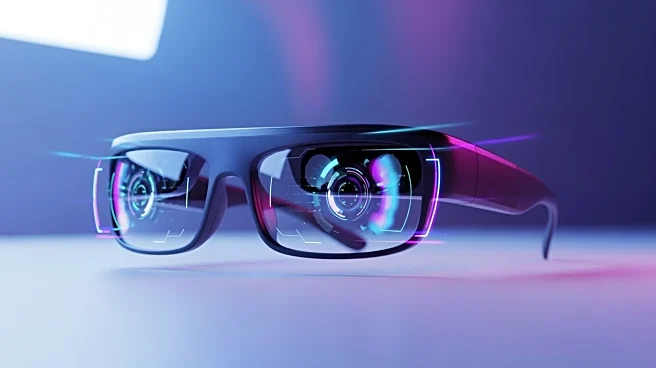What's Happening?
In 2025, several augmented reality (AR) devices are poised to redefine user expectations and experiences. Apple has upgraded its Vision Pro headset with the M5 chip, enhancing rendering capabilities and display
quality. Samsung's Galaxy XR headset offers improved refresh rates and battery life, targeting users who prioritize display smoothness. Meta's Ray-Ban smart glasses introduce a casual AR experience with a lens display and wristband controller. Snap's Spectacles, powered by Snap OS 2.0, support WebXR, expanding app possibilities. The Meta Quest 3S headset is highlighted for its affordability and accessibility, while Windows Mixed Reality Link enhances enterprise applications through PC tethering.
Why It's Important?
These advancements in AR technology signify a shift towards more immersive and accessible experiences for both consumers and enterprises. Apple's Vision Pro and Samsung's Galaxy XR cater to high-end users seeking superior display quality, while Meta and Snap focus on casual and web-native AR experiences. The Meta Quest 3S offers a budget-friendly option, broadening AR's reach. These developments could drive increased adoption of AR technology across various sectors, including gaming, education, and enterprise applications, potentially transforming how users interact with digital content.
What's Next?
As AR technology continues to evolve, manufacturers are likely to focus on improving hardware capabilities, such as display quality and battery life, while expanding software ecosystems to support a wider range of applications. The integration of AR into everyday devices, such as smart glasses, may lead to new use cases and increased consumer interest. Enterprises may explore AR for training, design, and productivity, leveraging PC tethering for more complex applications. The ongoing development of cross-platform apps and WebXR storefronts could further enhance AR's accessibility and appeal.
Beyond the Headlines
The growth of AR technology may have broader implications for industries such as retail, healthcare, and entertainment, where immersive experiences can enhance customer engagement and service delivery. Ethical considerations, such as privacy and data security, will become increasingly important as AR devices collect and process user information. The expansion of AR technology could also influence cultural and social dynamics, as users integrate digital experiences into their daily lives.









